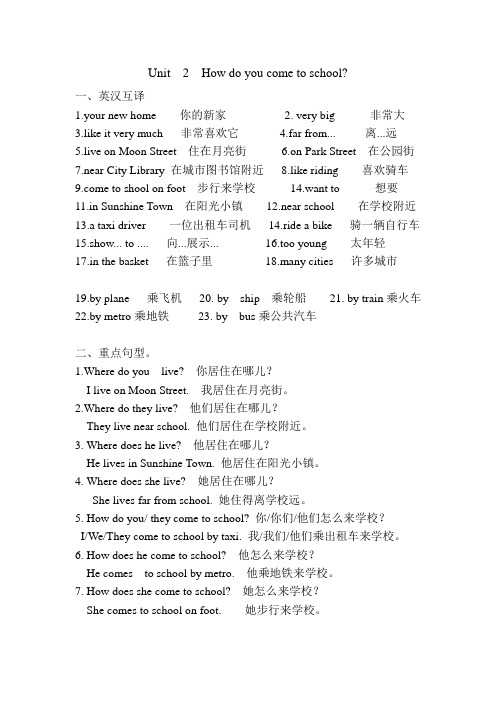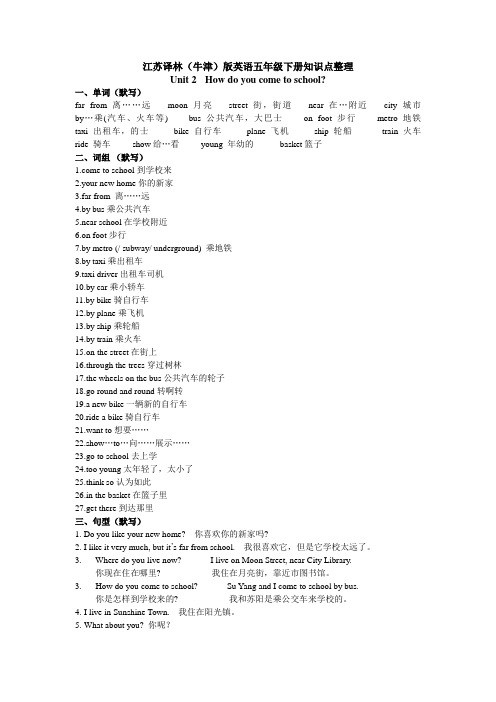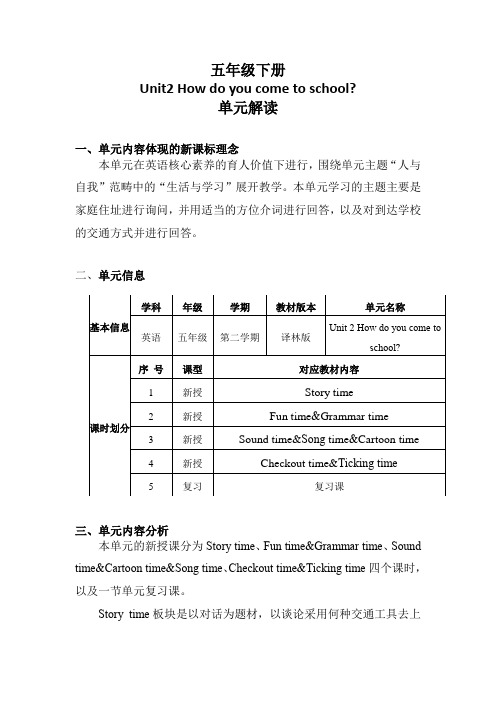新译林英语5BUnit2Howdoyoucometoschool知识点归纳
Unit 2 How do you come to school5B五年级英语第二学期知识点复习整理归纳

Unit 2 How do you come to school?一、英汉互译1.your new home 你的新家2. very big 非常大3.like it very much 非常喜欢它4.far from... 离...远5.live on Moon Street 住在月亮街6.on Park Street 在公园街7.near City Library 在城市图书馆附近8.like riding 喜欢骑车e to shool on foot 步行来学校14.want to 想要11.in Sunshine Town 在阳光小镇12.near school 在学校附近13.a taxi driver 一位出租车司机14.ride a bike 骑一辆自行车15.show... to .... 向...展示... 16.too young 太年轻17.in the basket 在篮子里18.many cities 许多城市19.by plane 乘飞机20. by ship 乘轮船21. by train乘火车22.by metro乘地铁23. by bus乘公共汽车二、重点句型。
1.Where do you live? 你居住在哪儿?I live on Moon Street. 我居住在月亮街。
2.Where do they live? 他们居住在哪儿?They live near school. 他们居住在学校附近。
3. Where does he live? 他居住在哪儿?He lives in Sunshine Town. 他居住在阳光小镇。
4. Where does she live? 她居住在哪儿?She lives far from school. 她住得离学校远。
5. How do you/ they come to school? 你/你们/他们怎么来学校?I/We/They come to school by taxi. 我/我们/他们乘出租车来学校。
译林版五年级英语下册Unit2Howdoyoucometoschool知识要点归纳

译林版五年级英语下册Unit2Howdoyoucometoschool知
识要点归纳
How do you come to school
一. 教学内容:
Unit 2 How do you come to school
二. 教学目标:
1. 知识目标:熟练掌握本单元中的单词、词组、句型和语法。
2. 能力目标:运用本单元所学到的单词、句型向别人介绍路程及交通方式。
三、教学重点和难点:
1. 距离的表示方法。
2. 句型It takes sb. some time to do sth.
四. 语法项目:
1. 人称代词的宾格。
2. 疑问副词how引导的特殊疑问句。
五. 重点知识:
单词:本单元课后单词的音、形、意
词组:
1. how far 多远
2. how long 多久
3. by subway 乘地铁
4. by train 乘火车
5. by taxi/take a taxi 乘出租车
6. get to/arrive at, in 到达
7. go to work 去上班
8. 10 kilometers from my home 距离我家10公里远
9. be far from 距离……远
10. get home 到家
11. get there 到那儿
12. about half an hour 大约半小时
13. go to school on foot 走着去上学
14. leave home quite early 很早离开家。
Unit 2 How do you come to school 重点知识归纳(素材)译林版

15.by taxi乘出租车
16.take a taxi乘出租车
17.a taxi driver
一名出租车司机
18.by metro乘地铁
19.take the metro乘地铁
20.by plane乘飞机
21.take a plane乘飞机
22.by train乘火车
动词ing的变化规章:
1)一般状况下,直接加ing;(help-helping;look-looking)
2)以不发音e结尾的动词,去e加ing(ride-riding;dance-dancing)
3)以“辅音字母+元音字母+辅音字母”结尾的动词,双写尾字母加ing。(swim-swimming;run-running;shop-shopping)
Mike sits far from me.迈克坐的离我很远。
4.Where do you live now?你现在住在哪里?
where是特殊疑问词,意思是“哪里”,对“地点”提问。
Where are you from?你来自哪里?
Where do they want to go?他们想要去哪里?
5.Liu Tao lives on Park Street.刘涛住在公园街。
由于主语Liu Tao是“第三人称单数”,所以谓语动词live用“第三人称单数形式”,后面直接加s。
动词第三人称单数的变化规章:【特殊变化:have--has】
1)一般状况下,直接加s;
2)以o,s,x,ch,sh结尾的动词,在词尾加es;
3)以“辅音字母+y”结尾的动词,把y变为ies。
【留意:除了a,e,i,o,u,其他21个字母都是辅音字母】
译林版英语五下Unit 2《How do you come to school》word单元知识点整理

江苏译林(牛津)版英语五年级下册知识点整理Unit 2 How do you come to school?一、单词(默写)far from 离……远moon 月亮street 街,街道near在…附近city 城市by…乘(汽车、火车等) bus公共汽车,大巴士on foot 步行metro地铁taxi 出租车,的士bike 自行车plane 飞机ship轮船train火车ride 骑车show给…看young 年幼的basket篮子二、词组(默写)e to school到学校来2.your new home你的新家3.far from 离……远4.by bus乘公共汽车5.near school在学校附近6.on foot步行7.by metro (/ subway/ underground) 乘地铁8.by taxi乘出租车9.taxi driver出租车司机10.by car乘小轿车11.by bike骑自行车12.by plane乘飞机13.by ship乘轮船14.by train乘火车15.on the street在街上16.through the trees穿过树林17.the wheels on the bus公共汽车的轮子18.go round and round转啊转19.a new bike一辆新的自行车20.ride a bike骑自行车21.want to想要……22.show…to…向……展示……23.go to school去上学24.too young太年轻了,太小了25.think so认为如此26.in the basket在篮子里27.get there到达那里三、句型(默写)1. Do you like your new home? 你喜欢你的新家吗?2. I like it very much, but it’s far from school. 我很喜欢它,但是它学校太远了。
Unit2 How do you come to school(单元解读)五年级英语下册(译林三起)

五年级下册Unit2 How do you come to school?单元解读一、单元内容体现的新课标理念本单元在英语核心素养的育人价值下进行,围绕单元主题“人与自我”范畴中的“生活与学习”展开教学。
本单元学习的主题主要是家庭住址进行询问,并用适当的方位介词进行回答,以及对到达学校的交通方式并进行回答。
二、单元信息三、单元内容分析本单元的新授课分为Story time、Fun time&Grammar time、Sound time&Cartoon time&Song time、Checkout time&Ticking time四个课时,以及一节单元复习课。
Story time板块是以对话为题材,以谈论采用何种交通工具去上学为话题的语篇教学,课文的层次比较清晰,主线明确。
词汇与句型的教学不能脱离语篇和语境,必须始终与课文内容融合。
教学设计由四个环节组成:Warm up; Let’s learn; Let’s practice; Summary。
在多个教学活动中都融入了生活化的情景,采用多模态引入思维导图,引导学生对文本进行回顾和归纳,将知识内化于心。
最终让学生在学习语篇的过程中掌握交通方式及地点类词汇,以及主要句型Where do/does…live?和How do/does …come to school?及其问答,并能熟练朗读课文。
Grammar time板块主要讲述Where和How的句型结构。
在教学中从与学生的自由交流入手,过渡到对文本的回顾,总结出重点句式,以归纳演绎法引出语法板块。
再带领学生对人称和动词形式进行辨析。
Fun time以小组调查报告的方法进行趣味性的操练。
接下来通过让学生交流和汇报等方式完成调查任务,进一步巩固句型和语法。
整节课主要由四个环节组成: Let’s review; Let’s learn; Let’s practice; Summary。
Unit 2 How do you come to school知识点

Unit 2 How do you come to school? 知识点一、词组:1. your new home 你的新家2. be far from school 远离学校3. live on Moon Street 住在月亮街4. near City Library 在市图书馆附近5. come to school 来学校6. come to school on foot=walk to school步行上学7. come to school by metro(来)= take a metro to school乘地铁(来)去上学8. come to school by taxi(来) = take a taxi to school乘出租车(来)去上学9. by bus / metro/ train/ plane/bike乘公交、乘地铁、乘火车、乘飞机、骑自行车10. a taxi driver一个出租车司机11. live near school 住在学校附近12. in Sunshine Town 在阳光镇13. live on Park Street居住在公园街14. through the trees 穿过树林15. on the street 在街上16. through the town 穿过城镇17. ride a bike 骑自行车18. like riding it in the park喜欢在公园里骑它(自行车)19. want to show his bike to Sam = would like to show Sam his bike想要展示他的自行车给山姆看20. do not think so不这么认为21. too young--- too old太年幼---太老22. always sit in the basket总是坐在篮子里23. go there on foot步行去那24. get there by bike骑自行车到达那里25. work on a big ship在一艘大轮船上工作26. go to many cities by ship乘轮船去许多城市27. go to work by car开小汽车去上班28. the wheels on the bus公交车上的轮子二、句型:1. Where do you live? I live on Moon Street, near City Library.你住在哪里?我住在市图书馆附近的月亮街。
(完整word版)译林英语5Bunit2单元知识点汇总,文档.docx
博学而笃志,切问而近思-------- 博学教育校训博学教育 5B 译林英语Unit 2 How do you come to school?一、near 在⋯附近by ⋯乘 (汽、火等 ) bus 公共汽,大巴士metro 地 taxi 出租,的士bike 自行 plane 机 ship 船 train 火ride show ⋯看basket 子city 城市二、短e to school 到学校来2.your new home 你的新家3.far from离⋯⋯4.by bus 乘公共汽5.near school 在学校附近6.on foot 步行7.by metro乘地8.by taxi 乘出租9.taxi driver出租司机10.by car 乘小11.by bike自行12.by plane 乘机13.by ship 乘船14.by train 乘火15.on the street 在街上16.through the trees 穿林17.the wheels on the bus公共汽的子18.go round and round啊19.a new bike 一新的自行20.want to 想要⋯⋯1 / 321.show⋯to ⋯向⋯⋯展示⋯⋯22.go to school 去学校23.too young 太年了,太小了24.think so 如此25.in the basket 在子里26.get there 到达那里三、句型1.Do you like your new home?你喜你的新家?解析: do 是助,其第三人称数形式是does,否定形式分:don’t 和 doesn’t。
助开的句子是一般疑句,一般用“Yes, ⋯do/does.或”“No,⋯don’t/doesn ’来t.回”答。
2.Where do you live? 你住在哪里 ?解析: where 是特殊疑,用来引特殊疑句,其回答不能地回答yes 或者no,而是要根据具体所来回答,比如里可以用“ I live+表示方位的”来回答。
【个人精心制作】新译林小学英语5BUNIT2单元知识点整理及复习题(二套)
新译林英语5BUNIT2单元知识点整理及复习题(二套)5B Unit 2 How do you come to schooldo you come to school你是怎样到学校来的解析:这里提问的是交通方式,回答一般用by+交通工具来回答,例如:by bus, by train等;注意:当表示步行这种交通方式时不用by,用on foot。
当主语是第三人称单数时,用“How does…come to school”来提问,回答同样用第三人称单数来回答。
wants to show his bike to Sam.鲍比想要把他的自行车给山姆看。
解析:want to想要做某事,想要某物是want后面直接加某物,想要做某事“want+to+动词原形”。
四、语法1. 询问某人住在哪里的句型:Where do/doeslive及其回答:live/ lives①一般情况下用“Where dolive”和“...live”来问和答。
②当主语是第三人称单数时,用“Where doeslive”和“...lives”来问和答。
2. 询问某人如何到某地的句型“How do/does”及其回答“...by/o n”。
① 一般情况下用“How do”和“...by/on”来问和答。
② 当主语是第三人称单数时,用“How does”和“...by/on”来问和答。
五、主要句子:1. Where do you live 你住在哪里 I live near school. 我住在学校附近。
2. How do you come to school 你是怎么来上学的I come to school by bike .我骑自行车来上学。
3. What about you 你呢4. I live on Moon Street. 我住在月亮街。
5. I live in Sunshine Town.. 我住在阳光城。
复习题(一)一、选择题( )1. —Yang Ling likes reading in the library. ___________ , Liu Tao—Me, too.A.H o w a b o u t y o uB.W h e r e a r e y o uC. How are you( )2. My father always ___________ to the park o n foot.( )3.—How does your English teacher go to wor k—___________. She lives near our school.metro foot bus( )4.—Can I go to the cinema by bike—___________., you can’t, she can , I can( )5. —___________ are you so sad—Because I can’t go to the party.( )6. Cinderella is not _________ because she ca n’t go to the party.( )7. —Dad, I want to go to school by bik e.—Oh, no, you are too _________.( )8.—Cola is bad for us. Don’t drink too muc h!—_________’s OK. ’re welcome. , I see.( ) don’t you go to Hongmei Park _________It’s near your home.train metro foot( ) always go to school by taxi, because my fat her is a _________.driver二、用括号内所给单词的适当形式填空。
五年级下册英语知识素材-U2 How do you come to school 译林版(三起)
5BU2 补充材料一、拓展表达:My ways to different placesI live in Golden New Town. It’s a big and beautiful community. It’s not far from school so I usually go to school by bus. There is Bus Number 55 or Bus Number 6. I can take either of them. I usually go home by bus too. Sometimes I walk home because I need(需要) to buy some bread or cakes for breakfast the next morning on my way home.In summer or winter holidays, I often go traveling with my family. Sometimes we go to Yunnan by plane. Sometimes we take a train to Beijing. It’s always a lot of fun.PS: vehicle / lane / take me home / go home alone / on my way to school二、语法要点1. How do / does …?2. go to school by bus = take a bus to schoolgo to the library on foot = walk to the librarygo there on foot = walk there3. show sb sth = show sth to sb, 代词只能放中间show it to me√show me it×4. 地名的书写:B eijing / C ity L ibrary / S unshine T own5. on the street / in Jiangpu Lane / at the prince’s house三、单元默写bike自行车bus公共汽车plane飞机ship轮船taxi出租车train火车metro地铁traffic交通through穿过come to school by car乘车来上学go home on foot步行回家take a train to Beijing乘火车去北京walk to the library走去图书馆live near (the) school住在学校附近live far from (the) school住得离学校远on M oon S treet在月亮街in S unshine T own在阳光小镇a taxi driver一个出租车司机too young太年轻太小show me your hands / show your hands to me给我看看你的手show your homework to Miss Li给李老师看你的家作show it to Peggy把它给Peggy看看many big cities许多大城市go to work去上班1. Where do you live? I live in Guotaimingdu.你住在哪里?我住在国泰名都。
苏教译林版英五年级下册Unit 2 how do you come to school 知识点总结
五年级下册Unit 2 How do you come to school?一.词汇:moon 月亮street 街,街道city城市bus 公共汽车,大巴士metro地铁taxi 出租车bike自行车plane 飞机ship轮船train 火车ride 骑车young年幼的basket 篮子far from离…远near 在…附近by… 乘… on foot步行show 给……看二.句型及语法:1.疑问副词how的用法:①对方式、手段、方法等进行提问How do you come to school? 你怎样来学校?②表问候How are you? 你好吗?/ How do you feel now? 你现在感觉怎么样?③询问天气How is the weather today? 今天天气怎么样?④询问年龄How old are you? 你多大了?⑤询问可数名词的数量,结构为“how many + 可数名词复数形式”How many books do you have? 你有多少本书?⑥how much询问不可数名词的数量或者询问价钱How much is this sweater? 这件毛衣多少钱?⑦how about用来征求意见How about this one?2.How do you come to school? 你是怎么来学校?come to sp. 来某地(固定词组)【注】:但遇到地点副词(home、here、there),介词to需要去掉。
如:come here;come home; go there.3.I like it very much. 我非常喜欢它。
like…very much 非常喜欢【注】:very like用法是不正确的。
4.be far from … 意为“离…远”,其后接地点,反义短语为:be near “离…近”。
The hospital is near the cinema.(同义句转换)The hospital is not far from the cinema.5.Where do you live now? 你住在哪里?“where” 为疑问副词,通常对地点进行问;此句中真正的谓语动词是live,则需要用助动词do / does进行提问,do / does 取决于主语的单复数。
- 1、下载文档前请自行甄别文档内容的完整性,平台不提供额外的编辑、内容补充、找答案等附加服务。
- 2、"仅部分预览"的文档,不可在线预览部分如存在完整性等问题,可反馈申请退款(可完整预览的文档不适用该条件!)。
- 3、如文档侵犯您的权益,请联系客服反馈,我们会尽快为您处理(人工客服工作时间:9:00-18:30)。
5B Unit 2 How do you come to school ?
一、词汇(能听、说、读、写、用下列词汇)。
四会单词:
1. moon 月亮
2. street 街,街道
3. near 在……附近
4. by…乘(汽车、火车等)
5. bus 公共汽车,巴士
6. metro 地铁
7. taxi 出租车,的士8. bike 自行车9. plane 飞机10. train 火车11. city 城市12. on foot 步行
三会单词:
1. ship 轮船
2. ride 骑车
3. show 给……看
4. young 年幼的
5. basket 篮子
短语:
1. your new home 你的新家
2. very much 非常
3. be far from…离……远
4. live on Moon Street 住在月亮街
5. come to school 来学校
6. by bus 乘公共汽车
7. live near school 住在学校附近8. live in Sunshine Town 住在阳光城9. by metro 乘坐地铁10. by taxi 乘坐出租车
11. a taxi driver 一位出租车司机12. through the trees 穿过树
13. a new bike 一辆新的自行车14. go to school 去上学
15. show his bike to Sam 展示他的自行车给Sam
16. too young 太年轻17. think so 这样认为
18. in the basket 在篮子里19. go there 去那里
20. work on a big ship 在大轮船上工作21. get there 到达那里
22. go to many cities 去许多城市
二、句型(能听、说、读、写、用下列句式)。
1. Do you like your new home, Su Hai? 你喜欢你的新家吗, 苏海?
2. I like it very much, but it’s far from school.
我非常喜欢它,但是它离学校太远了。
3. Where do you live now? 你现在居住在哪里?
4. How do you come to school? 你怎么来学校?
5. Su Yang and I come to school by bus.
苏阳和我坐公共汽车来学校。
6. I live in Sunshine Town. 我住在阳光城。
7. He likes riding it in the park. 他喜欢在公园里骑它。
8. How does Sam go to school? Sam 怎么去上学?
三、语法。
1. be far from 意为“离……远”,其后接地点,反义短语为:be near 离……近。
例如:The park is near the cinema. = The park isn’t far from the cinema.
3. 怎么询问他人的出行方式。
例如:I go to the park by bike. How do you go to the park?
He goes to school on foot. How does he go to school?
四、语音。
tr /tr/ try street tree traffic
五、小作文。
How can we go to school
I live on Park Street in Huai’an. It’s far from my school. I often go to school by bus. My friend Mike lives on Nanhu Street. He lives near school. So he always goes to school on foot. Sometimes he goes to school by bike. We like our school.。
